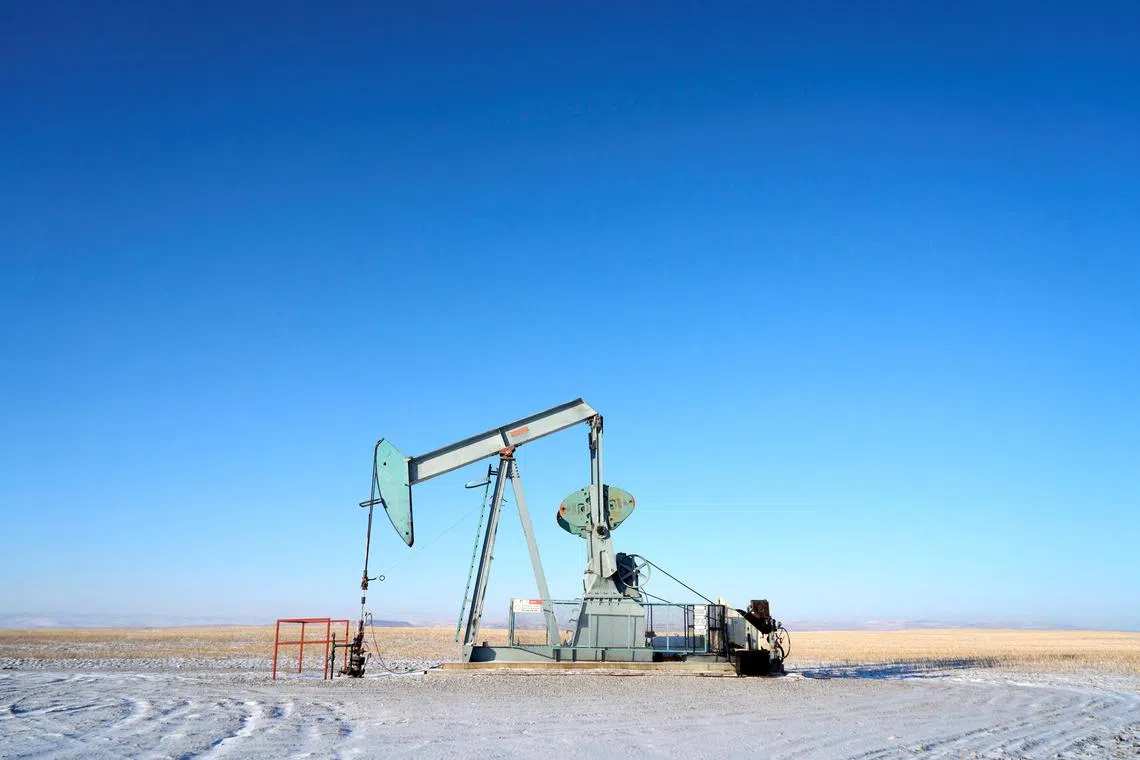Trump withdraws from Paris climate agreement, again
Sign up now: Get ST's newsletters delivered to your inbox

The move to withdraw from the Paris climate deal fits in with President Donald Trump's broader agenda to unfetter US oil and gas drillers from regulation so they can maximise output.
PHOTO: REUTERS
WASHINGTON – US President Donald Trump once again withdrew the US from the Paris climate deal on Jan 20, removing the world’s biggest historic emitter from global efforts to fight climate change for the second time in a decade.
The move places the US alongside Iran, Libya and Yemen as the only countries in the world outside the 2015 pact, in which governments agreed to limit global warming to 1.5 deg C above pre-industrial levels to avoid the worst impacts of climate change.
It reflects Mr Trump’s scepticism about global warming,
Mr Trump signed the executive order withdrawing from the pact in front of supporters gathered at the Capital One Arena in Washington.
“I’m immediately withdrawing from the unfair, one-sided Paris climate accord rip-off,” he said before signing the order.
“The United States will not sabotage our own industries while China pollutes with impunity,” he added.
Despite the withdrawal, UN Secretary-General Antonio Guterres is confident that US cities, states and businesses “will continue to demonstrate vision and leadership by working for the low-carbon, resilient economic growth that will create quality jobs”, associate UN spokeswoman Florencia Soto Nino said in a written statement.
“It is crucial that the United States remains a leader on environmental issues,” she said. “The collective efforts under the Paris Agreement have made a difference, but we need to go much further and faster together.”
The US has to formally notify Mr Guterres of its withdrawal, which – under the terms of the deal – will take effect one year later.
The US is already the world’s top producer of oil and natural gas thanks to a years-long drilling boom in Texas, New Mexico and elsewhere fuelled by fracking technology and strong global prices since Russia’s invasion of Ukraine
Mr Trump also withdrew the US from the Paris deal during his first term in office
The withdrawal this time around is likely to take less time – as little as a year – because Mr Trump will not be bound by the deal’s initial three-year commitment.
This time could also be more damaging to global climate efforts, said Mr Paul Watkinson, a former climate negotiator and senior policy adviser for France.
The US is currently the world’s second-biggest greenhouse gas emitter behind China, and its departure undermines global ambition to slash those emissions.
“It will be harder this time because we are in the thick of implementation, up against real choices,” Mr Watkinson said.
The world is now on pace for global warming of more than 3 deg C by the end of the century, according to a recent UN report, a level that scientists warn would trigger cascading impacts such as sea level rise, heatwaves and devastating storms.
Nations have already been struggling to make steep cuts to emissions required to lower the projected temperature increase, as wars, political tensions and tight government budgets push climate change down the list of priorities.
Mr Trump’s approach cuts a stark contrast to that of former president Joe Biden, who wanted the US to lead global climate efforts and sought to encourage a transition away from oil and gas using subsidies and regulations.
Mr Trump has said he intends to unwind those subsidies and regulations to shore up the nation’s budget and grow the economy but has said he can do that while ensuring clean air and water in the US.
Mr Li Shuo, an expert in climate diplomacy at the Asia Society Policy Institute, said the US withdrawal risks undermining its ability to compete with China in clean energy markets such as solar power and electric vehicles.
“China stands to win, and the US risks lagging further behind,” he said. REUTERS


